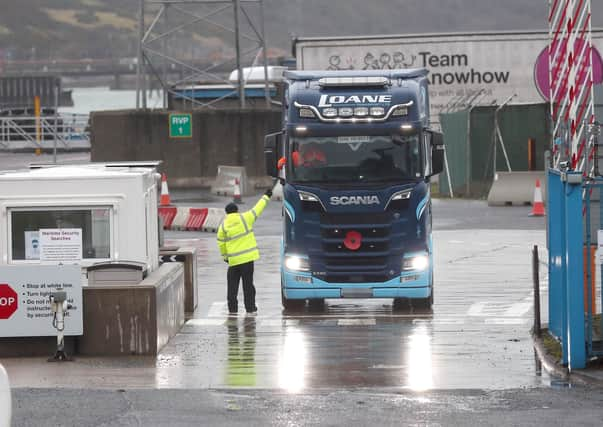Two experts give News Letter their verdicts on mooted modifications to Protocol


When it comes to checks on plants and organic material coming into Northern Ireland from Great Britain (known as sanitary and phytosanitary checks, or SPS), there has been a cautious welcome for the EU’s latest overtures.
However, there are questions over whether the measures go far enough.
Advertisement
Hide AdAdvertisement
Hide AdOn SPS checks, Maros Sefkovic had said: “We are talking about a significant range of retail goods that would be for sale to end consumers in Northern Ireland only.
“These would benefit from both simplified certification and an approximately 80% reduction of checks and controls required today.
“Let me illustrate what this means: imagine you are a Northern Irish business importing products of animal origin, like yoghurt, cheese or chickens, from Great Britain. More than 80% of the identity and physical checks previously required will now be removed. This will significantly ease the process for bringing food supplies from Great Britain to Northern Ireland.
“Similarly, a lorry transporting different food products, like dairy, meat, fish, fruit and vegetables, from Great Britain to supermarkets in Northern Ireland will now just need one certificate stating that all goods of different types, class or description meet the requirements of EU legislation.
Advertisement
Hide AdAdvertisement
Hide Ad“So if you are transporting a hundred different food products, only one certificate is needed instead of a hundred.
“For all this to work in practice, however, the UK government needs to do its part – for example, by ensuring that permanent Border Control Posts are up and running, as agreed a long time ago.”
James Barnes, the chairman of the UK-wide Horticultural Trades Association, said: “It is encouraging to see that negotiations which could improve the situation for horticultural businesses and gardeners in Northern Ireland are underway, but there is much in what we know of the proposals that requires further clarification.
“This EU position is in no way the final negotiated position for trade into NI.
Advertisement
Hide AdAdvertisement
Hide Ad“The two biggest challenges our members face - the inability to send certain types of plants to Northern Ireland and the costly and time consuming extra physical checks at borders, do not, at this time, appear to be resolved by the proposals.
“Without solutions to these issues, growers will still be unable to import young plant material to grow on and garden retailers will continue to struggle to source the stock of the plants and shrubs their customers want to buy. Choice is already limited, and prices will continue to rise.
“This is bad for business, bad for the environment and bad for the enthusiastic gardeners of Northern Ireland who ultimately lose out.”
Meanwhile Esmond Birnie, one of Northern Ireland’s leading economic brains, based at Ulster university, told the News Letter: “Given that until very recently the EU27/European Commission line was that there would be no movement at all from the original Protocol, the shift that has occurred is welcome.
Advertisement
Hide AdAdvertisement
Hide Ad“The European Commission has obviously tried to present all of this to make the concessions look as large as possible.
“For example, the Vice President says “simplified certification and a reduction of up to 80% of the checks and controls required today”.
“I think he is comparing against what would be the case if the Protocol was fully applied; for example, NO grace period exemptions.
“So the ‘real reduction’ in checking compared to the actual situation on October 15, 2021 is not as big as 80%, albeit still substantial.
Advertisement
Hide AdAdvertisement
Hide Ad“He’s asking for real time trade data for GB–NI. As an economist I’ve mixed feelings about that.
“On the one hand I love to see more data about what has actually been happening to the quantity of GB-NI trade movements.
“On the other hand, collecting that data will itself cost some money and will impose burdens on firms.
“I still think the EC/EU can’t just dismiss ECJ ultimate oversight as a legal necessity given NI’s de facto membership of the Single Market.
Advertisement
Hide AdAdvertisement
Hide Ad“Of course, ECJ has to have a role in interpreting what EU law means.
“However, in a UK-EU dispute about interpretation it would seem only natural justice to go to genuinely third party.
“After all, trade disputes between the EU, UK, and US (for example. on aircraft or whisky manufacturing) go through the WTO.”
More from the News Letter:
Advertisement
Hide AdAdvertisement
Hide AdA message from the Editor:
Thank you for reading this story on our website. While I have your attention, I also have an important request to make of you.
With the coronavirus lockdown having a major impact on many of our advertisers - and consequently the revenue we receive - we are more reliant than ever on you taking out a digital subscription.
Subscribe to newsletter.co.uk and enjoy unlimited access to the best Northern Ireland and UK news and information online and on our app. With a digital subscription, you can read more than 5 articles, see fewer ads, enjoy faster load times, and get access to exclusive newsletters and content.
Visit www.newsletter.co.uk/subscriptions now to sign up.
Advertisement
Hide AdAdvertisement
Hide AdOur journalism costs money and we rely on advertising, print and digital revenues to help to support them. By supporting us, we are able to support you in providing trusted, fact-checked content for this website.
Ben Lowry
Editor